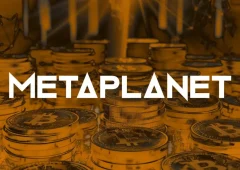Bitcoin Mining Profitability Declines as Hashrate Surges
15.10.2024 17:00 1 min. read Alexander Zdravkov
Jefferies recently reported a decline in Bitcoin (BTC) mining profitability for September, despite a surge in the network's hashrate.
Specifically, daily revenue per exahash fell by 2.6% month-over-month, indicating reduced earnings for miners as competition increased, with the hashrate rising by 1.7%.
North American Bitcoin mining firms boosted their production share from 19.9% in August to 22.2% in September, thanks to improved operational efficiency in cooler temperatures. Marathon Digital led with 705 BTC mined and a hashrate of 36.9 exahashes per second (EH/s), while CleanSpark followed with 403 BTC.
Looking ahead, October may pose challenges for miners, with an anticipated 11% increase in hashrate potentially outweighing a mere 5% rise in Bitcoin prices. After April’s halving, which reduced mining rewards from 6.25 BTC to 3.125 BTC, annual revenue losses for the industry could exceed $10 billion.
The report suggests potential favorable policies for the mining sector regardless of the U.S. presidential election outcomes. In contrast, Bernstein posits that a Trump win could drive Bitcoin to new heights, while the market awaits clearer signals from Democratic candidate Kamala Harris.
-
1
Bitcoin: What to Expect After Hitting a New All-time High
10.07.2025 14:00 2 min. read -
2
Standard Chartered Becomes First Global Bank to Launch Bitcoin and Ethereum Spot Trading
15.07.2025 11:00 1 min. read -
3
Vanguard Now Owns 8% of Michael Saylor’s Strategy, Despite Calling BTC ‘Worthless’
15.07.2025 17:09 2 min. read -
4
What’s The Real Reason Behind Bitcoin’s Surge? Analyst Company Explains
12.07.2025 12:00 2 min. read -
5
Bitcoin Reaches New All-Time High Above $116,000
11.07.2025 7:56 1 min. read
Ethereum Spot ETFs Dwarf Bitcoin with $1.85B Inflows: Utility Season in Full Swing
Ethereum is rapidly emerging as the institutional favorite, with new ETF inflow data suggesting a seismic shift in investor focus away from Bitcoin.
Ethereum Flashes Golden Cross Against Bitcoin: Will History Repeat?
Ethereum (ETH) has just triggered a golden cross against Bitcoin (BTC)—a technical pattern that has historically preceded massive altcoin rallies.
Bitcoin Banana Chart Gains Traction as Peter Brandt Revisits Parabolic Trend
Veteran trader Peter Brandt has reignited discussion around Bitcoin’s long-term parabolic trajectory by sharing an updated version of what he now calls the “Bitcoin Banana.”
Global Money Flow Rising: Bitcoin Price Mirrors Every Move
Bitcoin is once again mirroring global liquidity trends—and that could have major implications in the days ahead.
-
1
Bitcoin: What to Expect After Hitting a New All-time High
10.07.2025 14:00 2 min. read -
2
Standard Chartered Becomes First Global Bank to Launch Bitcoin and Ethereum Spot Trading
15.07.2025 11:00 1 min. read -
3
Vanguard Now Owns 8% of Michael Saylor’s Strategy, Despite Calling BTC ‘Worthless’
15.07.2025 17:09 2 min. read -
4
What’s The Real Reason Behind Bitcoin’s Surge? Analyst Company Explains
12.07.2025 12:00 2 min. read -
5
Bitcoin Reaches New All-Time High Above $116,000
11.07.2025 7:56 1 min. read


